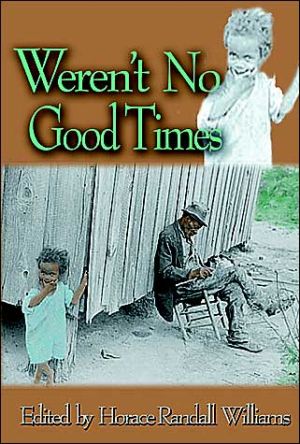

 |

|

The average rating for Weren't No Good Times: Personal Accounts of Slavery in Alabama based on 2 reviews is 4.5 stars.
Review # 1 was written on 2015-07-28 00:00:00 Stephanie Krebs Stephanie KrebsThis is a good book about something important. Weisenburger appears to have found the answer to one of the most important questions about the Civil War; what was really behind the Dred Scott Decision? That said, there are some interesting questions raised by how the book is written. Weisenburger appears to have solved the problem of the proper way to discuss slavery in the modern academic context. He simply reminds the reader at every possible opportunity that slavery is bad. Everything that happens is awful. When the next thing happens, he explains how it was awful too, then helpfully reinforces it with other awful things the slave owners did, lies that the slave owners told, sins that the slave owners committed. It's quite effective, and it's a nice change from the old "neutral and objective to an absolute fault" method of writing about slavery. It also gets a little weird. I'm just not used to scholarly writers taking sides to this degree. Is it deserved? Good question. I've read scholarly writing about all the worst things that have ever happened, from the diseases that wiped out North America to the Tiapeng Rebellion to Cromwell in Ireland. American plantation slavery is certainly among the very worst things that have ever happened, but is it actually so much worse than the Belgian Congo or medical experimentation on prisoners that Weisenburger can't contain himself? If an author can discuss the Holocaust, the Holodomor or the Gulag without reminding me every third sentence that it was bad, can't Weisenburger? Should he? Maybe this works as an introductory text, because he really does cover the major issues of American plantation slavery extremely well, in a way that the books of previous eras simply did not. He correctly notes the enormous role of sexual servitude, of the differences between border state slavery and Deep South slavery, of the differences between the way the people of the day saw the world and the way their world really was. But this approach seems troubling on further study. If he is correct that Margaret Garner's act of infanticide was a completely unique event that captured attention because Garner chose to kill her children as an act of political defiance, to protest her own sexual servitude and to hurt the father of her children, the man who owned her as a slave, then I am willing to agree that my judgement of her is irrelevant. I simply can't understand what drove her to do that, and the fact that the specific form of her "protest" was directly catalyzed by cultural phenomena is of interest only to the student of human nature. It has no moral bearing. However, if I am to casually suspend judgement of infanticide, why must I heap calumny elsewhere? It's not like we're talking about some awesome, incredible, amazingly pleasant infanticide here. Maybe by killing her child Margaret Garner sped the freedom of a third of this nation (in one sense, because women getting to vote was still far in the future). But in another sense, her child was only six years from freedom, so as an armchair quarterback of history, maybe murdering her wasn't exactly the best way to help her. Garner didn't know that, and she knew a whole lot I don't know, so who am I to judge? Obviously I am no one to judge. So am I therefore the one to judge the slave owner? Should I judge the abolitionist lawyer, Jolliffe? Because the man was as plain a fool as I've ever read about in a history book. Should I judge the way his patently ridiculous way of fighting slavery -- by going to court and giving long speeches about how the protection of religion under the 1st Amendment meant that people didn't have to obey laws they didn't like, in direct defiance of what the Bible actually says about slavery to boot -- appears to have triggered the exact disaster of Dred Scott that caused America to become so completely intolerable that it began the inevitable slide to the Civil War that would end in the deaths of an enormous number of the people that it was meant to save? Should I judge the abolitionist celebrity Lucy Stone, whose sweet promises to the Garners came to nothing but whose dramatic courtroom appearance and sniper-sharp oratory publicly shamed Gaines, the owner of the Garners, into refusing to ever give up his "property?" If I am not, why am I to shame Gaines? Here is a man who was no better than anyone and living with, on whatever level he could face it, the murder of his daughter by a woman that he believed himself to love. Yes, the Slave South was among the most decrepit and depraved societies ever. But it was only among them, it was not the first, and this man Gaines is certainly worthy of the historical objectivity that we grant Hitler and King John. I guess the book is so good that the guy gets to write it the way he wants to. If you're looking for a first book to read about American plantation slavery, this is the one. |
Review # 2 was written on 2013-03-26 00:00:00 Tonio Bianca Tonio BiancaThis is an interesting story, and living in the area where it happens makes it more relevant. Unfortunately, the author is so intent on discussing the facts of the case and giving details about the actual legal drama and surrounding abolitionist conflict that the human part of the story gets a bit lost. I didn't finish the book because it was due at the library (and had a hold on it) but I'm not sure I would have finished it anyways. |
CAN'T FIND WHAT YOU'RE LOOKING FOR? CLICK HERE!!!